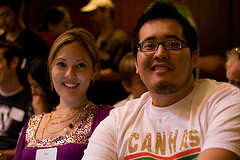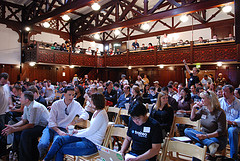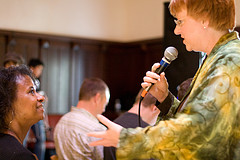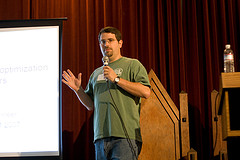Notes from WordCamp 2007: Day 1
On the weekend of July 22 and 23, I and about 400 other folks attended WordCamp 2007 in San Francisco. This is a conference about WordPress blogging software, and blogging itself. I am usually a bit wary of killing my weekend by spending the bulk of it with a bunch of nerds. Especially bloggers. But then, I am a nerd, and this is, I admit, a blog . . . that and registration was merely $25 and covered my food for the weekend. That’s a pretty compelling deal for the unemployed! Added value was found at the open bar on Saturday night at one of my favorite bars: Lucky 13.
Here are notes I compiled during the Saturday presentations.
Podcasting
I am not big on Podcasting, but this presentation piqued my interest. Dan Kuykendall hyped his PodPress plugin. “Okay, okay,” I thought, “he is cleaning up the feeds in a proper fashion” . . . but that is just the start. PodPress has features to give you previews of how content will look in the various podcasting portals, and also embedded media players for a lot of the audio and video formats you might want on your blog. It looks to me as if PodPress could be a best-of-breed plugin for integrating multimedia on a WordPress blog.
Dan started his presentation showing how easy the technical aspect of podcasting can be: a microphone, a little box to plug it in to, and if you’re Dan, a milk crate lined with noise-dampening foam. Add to that excellent software, and all you really need is to come up with some content . . .
Blogs vs Journalism

I CAN HAS CHEEZBURGER? may have nothing to do with blogging versus journalism, but they are a lot cuter than the luminaries on stage. Nyah! (CC: Randy Stewart)
John Dvorak and Om Malik sat in high-backed chairs to chat about stuff. The sort of conversation that I enjoy, and mostly forget. Here are some notes I took:
Om Malik: 4% of my readers are from India. 90% of the Indian readers are reading on cell phones.
Both men agreed that responding to comments is important. You need to moderate out the spam and the idiots. As far as encouraging comment quality, John offered that “comment rating is bull: unless you’re talking about book reviews or restaurant reviews.” I am inclined to agree. Om said that every year, they take their top ten commenters and try to make them authors.
The question of the day is the difference between blogging and journalism, whether there is any, and more importantly, what if you are a blogger and you want to be respected as a journalist? John Dvorak explained that blogs don’t have to look like blogs anymore. Bloggers often aren’t taken too seriously, but you can adopt a “neo-blog” layout that doesn’t look like a blog, and at first impression, you may be taken more seriously. He offered an example: XXLMag.com. The guy who does XXLMag was in the audience, and he explained that yes, in fact, XXLMag is a WordPress blog: but he hacked on the theme to the point that it looks and feels like a print magazine.
Kicking Ass Content Connections
Lorelle spoke after lunch. She is charismatic, energetic, extroverted, and very human and articulate. Not all the nerds in the room fully appreciated her style, or her substance, but I enjoyed her a great deal. What was she talking about? How to be a better blogger.
Notes:
What to Write:
Offer something new!
Not everything has been said
What has been said can often be said better
Search first: don’t re-write well-covered topics.
Filling in holes:
Where are the holes in what has already been written? Fill the holes!
We learn in school to accept received wisdom: we learn not to ask why. Ask why!
Where are your holes?
When is the last time you really looked at your site?
What is missing? What should be added? What should be removed?
Be the “wiser” blogger–don’t rush to post during the frenzy of news that is happening right now. Wait until the frenzy has passed, and you have calmed down. Say your piece with a bit of perspective. When your readers read you, they will have some chance to calm down. They’ll read your writing after the frenzy, when they are calm. If they are calm, they are more likely to think that you are wise and profound, especially compared to content produced in-the-frenzy.
What is a successful blog? Lorelle cited Liz Strauss in that “when you write, you write for one person: yourself” Lorelle explained that after you have been traveling on the road for a while, when you get back home and sit down on your own toilet, you feel extremely comfortable and at ease. When you visit your blog, you should feel the same sensation of comfort and relief: this is your space: you are home! . . . what is the point? By writing for yourself, you are writing in your voice, your style, your level of erudition, whatever: so when someone like you comes to your site, they too, feel at home. They feel comfortable. Anyway. That is philosophy.
An aside: I re-design my site every few years . . . as I change I become less at ease with the look, the feel, the style, and the way I write, and I go and I change my environment: home, clothing, web design, whatever, to be more consistent with whatever I am trying to get at. I recently re-designed this site: stripping pages down in complexity and emphasizing simple, clean content. That is what I am trying to achieve in my own life these days. And I notice, that when I arrive at sites with simple web design like this, I do feel a little more “at home” . . .
“Make your blog for you and to you.”
Or, to borrow an idea from romantic relationships:
“Be the other you wish to find.”
She went on to engage the audience: can you tell when a blogger is “faking it”? Yup . . . this was her way of introducing the idea of “write for the future” . . . I would say that when you go back and read something next week, next month, next decade . . . is there still something to be had? In my case: not always. But what I have noticed about my own web site is that my most popular traffic at any given time is older stuff. The majority of traffic on a site like this that spreads over a decade is certainly not what I wrote this week!
Blogging is about a conversation with your readers and with other bloggers:
How do you get the conversation going?
Don’t finish the idea: leave room for readers to react and finish for you.
“Ten Tips for . . .” make it seven! People can contribute 8, 9, 10 . . .
Leave something “missing” for readers to respond to.
Readers should believe that you respond to every comment.
Basically: leave room for readers to collaborate, and the impression that you value their contribution.
Ideal: You and your reader are an old married couple . . . you finish each other’s sentences!
It is important to link to other blogs. (I suck at this.)
Read: “How Not to Comment on Comments” (Hey, she got me to link to her blog!)
As far as the “state of the art” on filtering comment spam (for WordPress):
The Triumvirate: Akismet, Spam Karma, “Bad Behavior”
(Akismet is plenty for me.)
Blog Monetization

Amidst 400 bloggers, one handsome man raises his hand to ask a pertinent question. (CC: Josh Hallett)
I was looking forward to Jeremy Wright’s presentation on Blog Monetization. I was hoping to hear some good advice as to dos and don’ts, and what people might prefer to AdSense. I make about $15 to $20 per month from advertising revenue here, and if I could be getting a bit more without selling my soul and whoring my web site out, that would be really nice.
Jeremy opted to go for a panel format, which sounded like a neat idea. Unfortunately, Jeremy doesn’t seem completely at ease managing a panel discussion yet, and tended to talk over his guests. The forum felt a bit ADD and I didn’t get as much from it as I had hoped.
The basics:
- Managing site advertising can be a full-time job: you won’t be able to “live” off your blog without working for it.
- You make more money from work and opportunities you land because of your blog than revenue generated by the blog itself.
- Additional revenue may be available through content syndication in the near future, through sites like Newstex.
- If you really want to go for the easiest money, do product reviews and link to merchant referral programs.
At the end, the following advice was offered:
- Improve 1% per week — just keep making your site better in little ways, write better content, etc.
- Don’t fall into the thinking of “gotta make money”
- Keep Your Passion
- Never Lose your Passion
Yay Passion!
Getting Involved with WordPress
Lloyd Budd gave a little pep talk and Mark Jaquith got in to further detail . . .
- Some concern over the ongoing utility of
#wordpress, on FreeNode. - A lot of good coordination takes place on the mailing lists.
- The Codex can use a lot of help, and tutorial stuff like screencasts and podcasts, as well as developer docs.
I’m hoping to get more involved in the documentation.
It was also pointed out that contributors have a tendency to enjoy contributing so much that they get burnt out and need to take vacations from WordPress.
Designing the Obvious
Robert Hoekman was introduced as having written a fantastic book, called “Designing the Obvious” and Matt so loved this book that he invited Robert to speak. Robert had assembled a presentation called “What Makes an Obvious Blog” but, inspired by the spirit of the event and the afternoon heat, Robert announced that he had decided to toss his presentation and “Totally Fricking Improvise” and garnered a round of applause. He dove headfirst into a stunning belly flop in front of 400 people. Bloggers can respect such temerity.
He started out pretty well . . . the premise that you should figure what design elements are essential for a blog, and go from there, but he ended up rambling about Tumblr blogs, among other things. He eventually pointed out the importance of being on-topic.
Ah. Most people hate blogrolls–not essential!! But Matt came to their defense, saying he has discovered a lot of blogs that way. A good approach to a blog roll would be to mix links in to the “read more” navigation area. Hrmmm.
Whitehat SEO for Bloggers
Matt Cutts, a Google Software Engineer, who works on web spam and search quality, caused many a blogger to swoon in the afternoon heat, as he gave a cogent presentation on WordPress, Search Engine strategies, and numerous other useful and insightful tidbits:
Favorite Plugins:
- Add Google Analytics to
footer.php - Democracy, for polls
- SEO Title to swap blog name and post title in
<TITLE> - WP-Cache
Casually work keywords in to your text:
Use the Google Keyword Tool to find synonym keywords that are “hot”
Vary words: different content in a post title and the post’s slug
Try to include synonyms while writing the post.
Readers will leave comments with additional synonyms you wouldn’t think of on to your post.
Post categories are also keywords.
Usability tips:
Crawlability: WordPress rocks for Googlebot
Make post-creation dates easy to find (how old is this article!?)
Check your site in a cell phone — audience suggested the WP-Mobile plugin
Full-text RSS feeds: make it easy on readers: more likely they will read, comment, link . . .
Your blog should do the standard pings (one reason I use WordPress–takes care of this stuff!)
Favorite Google Services:
Webmaster console (his baby)
Custom Search Engine (I recently added this!)
AdSense
Analytics
Also, Feedburner
A security tip: use Apache’s .htaccess to whitelist your home IP to access to /wp-admin/
Fun questions:
Q: So, what if I served special easy-to-crawl content to Googlebot?
A: Don’t do that! If Googlebot thinks you’re “masking” then you can say goodbye to your PageRank!
Q: Are some file extensions preferred over others?
A: Not with Google. The only extension that’s definitely bad is . . . (he let us take a guess . . . hrmm) . . . .exe! (HAHA!!)



Responses
Lorelle
Thanks for the great write up! You summed up the speakers wonderfully. Thank you. I really like your asides. That helps me and others to look at the lessons you learned. Great coverage!
Randy Stewart
Really nice write up for the event. I love the fact that between all the bloggers, photographers and videobloggers, coverage of events can be so thorough.
Glad you liked the images. First time I live-Flickrd an event.
Cheers,
Randy Stewart
Comment
Tiny Print:
<a href="" title=""> <abbr title=""> <acronym title=""> <b> <blockquote cite=""> <cite> <code> <del datetime=""> <em> <i> <q cite=""> <s> <strike> <strong>